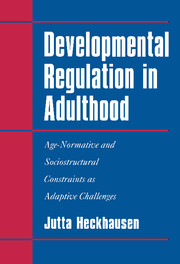 Developmental Regulation in Adulthood
Developmental Regulation in Adulthood Book contents
- Frontmatter
- Contents
- Acknowledgments
- List of Tables and Figures
- Introduction
- 1 Selectivity and Failure Compensation as Fundamental Requirements of Human Behavior and Development
- 2 The Life Course as a Context of Action
- 3 Primary and Secondary Control across the Life Span
- 4 A Model of Developmental Regulation across the Life Span
- 5 Developmental Goals as Organizers of Developmental Regulation
- 6 Developmental Regulation in Different Life-Course Ecologies
- 7 Social Comparisons as Prototypical Strategies in Developmental Regulation
- 8 Conclusions and Prospects for Future Research
- References
- Name Index
- Subject Index
1 - Selectivity and Failure Compensation as Fundamental Requirements of Human Behavior and Development
Published online by Cambridge University Press: 05 September 2009
- Frontmatter
- Contents
- Acknowledgments
- List of Tables and Figures
- Introduction
- 1 Selectivity and Failure Compensation as Fundamental Requirements of Human Behavior and Development
- 2 The Life Course as a Context of Action
- 3 Primary and Secondary Control across the Life Span
- 4 A Model of Developmental Regulation across the Life Span
- 5 Developmental Goals as Organizers of Developmental Regulation
- 6 Developmental Regulation in Different Life-Course Ecologies
- 7 Social Comparisons as Prototypical Strategies in Developmental Regulation
- 8 Conclusions and Prospects for Future Research
- References
- Name Index
- Subject Index
Summary
This chapter addresses the basic question of why regulation of behavior and development is needed. What are the fundamental challenges or problems that require regulatory processes? What obstacles does the individual have to overcome in order to organize his or her behavior? These questions lead to two key requirements of regulation, the management of selectivity and of compensation for failure or loss. Further chapters will consider the means by which the individual contributes to fulfilling these requirements (Chapter 3), especially in terms of regulating life-span development (Chapters 4 through 8) and the biological and societal mechanisms (Chapter 2) that constrain, support, and scaffold developmental regulation. In this first chapter, selectivity and failure/loss compensation are discussed as fundamental characteristics of any human behavior and of developmental regulation in particular (P. Baltes 1987; P. Baltes & M. Baltes 1990; J. Heckhausen & Schulz 1993a, 1995; Marsiske et al. 1995). Selectivity refers to the selection of goals and the focused investment of resources into goal attainment. An example is the selection of a field of study by a student and the subsequent investment of time, effort, and interest in this field. Compensation of failure and loss refers to efforts of an individual to make amends for the negative consequences of failing to attain a selected goal and of other circumstantial losses (e.g., losing a spouse).
- Type
- Chapter
- Information
- Developmental Regulation in AdulthoodAge-Normative and Sociostructural Constraints as Adaptive Challenges, pp. 7 - 18Publisher: Cambridge University PressPrint publication year: 1998


